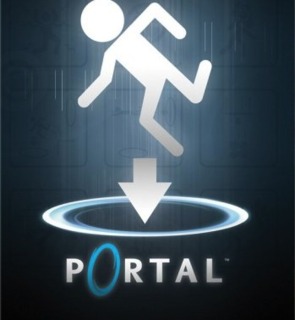This review approved by the Aperture Science Board of Quality Assurance and Control.
GLaDOS, Portal's wonderfully passive-aggressive villain, spends a good deal of time praising science throughout the game's campaign, and really, can you blame her? Where would our society even be without physics? Drifting in space, without any gravity to tether us to Earth, is the obvious answer - but we'd also be without a good deal of fantastic video games, including World of Goo, Burnout, and of course, Portal itself.
Thanks to all the quoting and overquoting everybody on the Internet knows the basic setup of Portal - you are Chell, a test subject at Aperture Science Laboratories, and your mission is to test the company's newest invention, the Portal Gun, with hopes of receiving cake and grief counseling at the experiment's end. You are aided/motivated/taunted/threatened by GLaDOS, a supercomputer who seems to be running things round the lab.
Portal is broken into 19 "test chambers" which will altogether take around three to four hours to beat on the first playthrough. The objective of these chambers tends to be the same: open the door to the next chamber by pushing buttons or activating various switches. Your only tool to do this is the Portal Gun, but it's powerful and loaded with possibilities. You can shoot a blue and an orange portal, and what goes in will come out the other. Momentum, speed and direction are all transferred through the portals - or as GLaDOS elegantly phrases it, "speedy thing goes in, speedy thing comes out." The resulting puzzles are fantastic, requiring careful planning, quick reflexes, and above all the ability to "think with portals." The portal mechanic is used in every way imaginable and then some; later puzzles can get rather complex, but the challenge is always fair and you come out of the experience feeling legitimately smarter.
Visually, Portal isn't much of a stunner - it uses the same Source engine Valve has been leaning on for years, and Aperture Labs is a fairly drab, monochromatic place with the only colours seeming to be "white" and "chrome." There isn't much in the way of sound effects or music, apart from the now-famous and fantastic ending song. GLaDOS' voicework is phenomenal; Valve did a good job masking Ellen McLain's voice, warping her into a high-pitched, frighteningly gleeful version of the Google Translate lady. The turrets have even more personality, with their creepy/cute exclamations of "There you are!" and "I see you!" before they start to unload lead into Chell.
Portal is definitely a special game, not just for its unique gameplay mechanic, but for the way it became woven into the very DNA of Internet culture almost overnight. It was the game that unwittingly birthed a zillion memes; most of which, miraculously, were so good that they're still funny almost four years later. But all the humour in the world, even at its driest and most dark, isn't enough to carry a game. Thankfully, Portal doesn't need to lean on that; the game underneath it is as imaginative and mind-boggling as they come. So go out and do some science. And if you feel like a slice of cake at the end, go right ahead; you deserve it, don't you?

